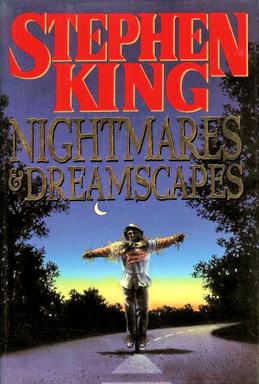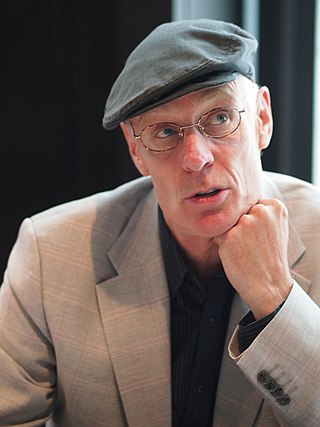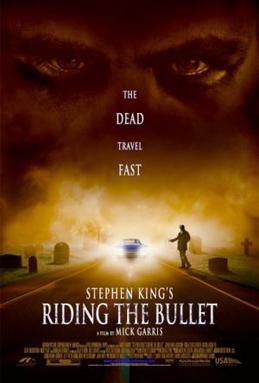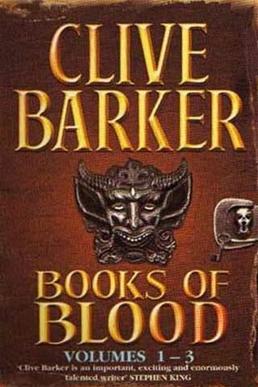
Clive Barker is an English writer, filmmaker and visual artist. He came to prominence in the mid-1980s with a series of short stories, the Books of Blood, which established him as a leading horror writer. He has since written many novels and other works. His fiction has been adapted into films, notably the Hellraiser series, the first installment of which he also wrote and directed, and the Candyman series.

Nightmares & Dreamscapes is a short story collection by American author Stephen King, published in 1993.

Matthew George Frewer is a Canadian-American actor and comedian. He portrayed the 1980s icon Max Headroom in the 1985 TV film and 1987 television series of the same names.

Nightbreed is a 1990 American dark fantasy horror film written and directed by Clive Barker, based on his 1988 novella Cabal. It stars Craig Sheffer, Anne Bobby, David Cronenberg, Charles Haid, Hugh Quarshie, and Doug Bradley. The film follows an unstable mental patient named Aaron Boone who is falsely led to believe by his doctor that he is a serial killer. Tracked down by the police, his doctor, and his girlfriend Lori, Boone eventually finds refuge in an abandoned cemetery called Midian among a tribe of monsters and outcasts known as the "Nightbreed" who hide from humanity.

Sleepwalkers is a 1992 American horror film written by Stephen King and directed by Mick Garris. The film stars Brian Krause, Mädchen Amick and Alice Krige. The film revolves around the last two survivors of a vampiric shapeshifting species that feed on the life force of human female virgins. It was the first time King wrote a screenplay intended for the screen first, rather than adapting one of his already-existing novels or stories.

Riding the Bullet is a 2004 horror film written, co-produced and directed by Mick Garris. It is an adaptation of Stephen King's 2000 novella of the same name. The film, which received a limited theatrical release, was not successful in theaters; it earned a domestic gross of $134,711.

The Shining is a 1997 three-episode horror television miniseries based on the 1977 Stephen King novel of the same name. Directed by Mick Garris from King's teleplay, it is the second adaptation of King's book after the 1980 film by Stanley Kubrick and was written and produced by King based on his dissatisfaction with Kubrick's version. The miniseries was shot at The Stanley Hotel in Estes Park, Colorado, King's inspiration for the novel, in March 1996.

Books of Blood is a series of six horror fiction anthologies collecting original stories written by British author, playwright, and filmmaker Clive Barker in 1984 and 1985. Known primarily for writing stage plays beforehand, Barker gained a wider audience and fanbase through this anthology series, leading to a successful career as a novelist. Originally presented as six volumes, the anthologies were subsequently re-published in two omnibus editions containing three volumes each. Each volume contains four, five or six stories. The Volume 1–3 omnibus contained a foreword by Barker's fellow Liverpudlian horror writer Ramsey Campbell. Author Stephen King praised Books of Blood, leading to a quote from him appearing on the first US edition of the book: "I have seen the future of horror and his name is Clive Barker."

Lawrence George Cohen was an American filmmaker. He originally emerged as the writer of blaxploitation films such as Black Caesar and Hell Up in Harlem, before becoming known as an author of horror and science fiction films — often containing police procedural and satirical elements — during the 1970s and 1980s. His directorial works include It's Alive (1974) and its sequels, God Told Me To (1976), The Stuff (1985) and A Return to Salem's Lot (1987).

The Stand is a 1994 American post-apocalyptic television miniseries based on the 1978 novel of the same name by Stephen King. King also wrote the teleplay and has a minor role in the series. It was directed by Mick Garris, who previously directed the original King screenplay/film Sleepwalkers (1992).

Cemetery Dance Publications is an American specialty press publisher of horror and dark suspense. Cemetery Dance was founded by Richard Chizmar, a horror author, while he was in college. It is associated with Cemetery Dance magazine, which was founded in 1988. They began to publish books in 1992. They later expanded to encompass a magazine and website featuring news, interviews, and reviews related to horror literature.
Hellraiser is a British-American horror media franchise that consists of eleven films, as well as various comic books, and additional merchandise and media. Based on the novella The Hellbound Heart by English author Clive Barker, the franchise centers around the Cenobites which includes the primary antagonist named Pinhead.

Mick Garris is an American filmmaker, screenwriter and novelist born in Santa Monica, California. He is best known for his work in the horror film genre, as well as making Stephen King adaptations.

Weekend of Horrors was traditionally a tri-annual traveling convention which focuses on horror films. Formerly produced in partnership with Creation Entertainment, the Weekend of Horrors show is now owned exclusively by Fangoria Magazine and is held once annually in Los Angeles, California.
Michael Gingold is an American journalist, screenwriter, and former editor-in-chief of Fangoria magazine.
"Chattery Teeth" is a short story by American writer Stephen King. It was originally published in Cemetery Dance and was later collected in Nightmares & Dreamscapes.
Vindication is independent film maker Bart Mastronardi's feature length psychological horror film, based on his award-winning short. The film is a morality tale about a young man whose attempt at suicide fails causing his guilt to manifest into reality.

Book of Blood is a 2009 British horror film directed by John Harrison and starring Jonas Armstrong, Sophie Ward, and Doug Bradley. It is based on the framing stories "The Book of Blood" and "On Jerusalem Street " from Clive Barker's Books of Blood.

Daniel Robitaille, colloquially known as Candyman, is a fictional character and the main antagonist of the Candyman film series. The character originated in Clive Barker's 1985 short story "The Forbidden". In the film series, he is depicted as an African-American man who was brutally murdered for a forbidden 19th-century interracial love affair; he returns as an urban legend, and kills anyone who summons him by saying his name five times in front of a mirror. The character is played by Tony Todd in Candyman (1992), Candyman: Farewell to the Flesh (1995), and Candyman: Day of the Dead (1999); Todd reprises the role in Candyman (2021), a sequel of the original 1992 film, with additional forms – souls brought into the Candyman "hive" – Sherman Fields, William Bell, Samuel Evans, George Stinney, James Byrd Jr., Gil Cartwright, and Anthony McCoy.
The following is a list of unproduced Clive Barker projects in roughly chronological order. During his long career, British artist Clive Barker has worked on several projects which never progressed beyond the pre-production stage under his direction. Some of these projects fell in development hell, were officially canceled, were in development limbo or would see life under a different production team.















